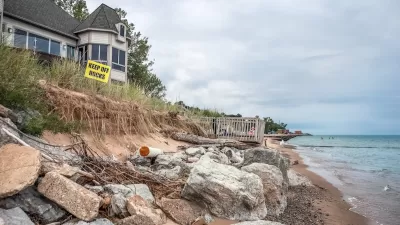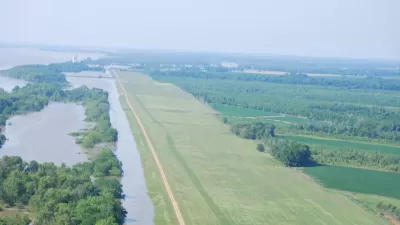In the face of federal cuts to climate resilience funding, a panel at ULI’s Resilience Summit offered suggestions for maintaining managed retreat and other climate adaptation programs.

With federal funding for emergency management and climate resilience projects under threat, city governments are reassessing how to achieve their resilience goals and continue plans for managed retreat — “Asking people to leave their homes and relocate from areas at risk of repeated environmental threats” — in areas highly prone to flooding or other disasters.
In a panel at the Urban Land Institute’s Resilience Summit, city leaders discussed the tools and strategies cities can use to acquire at-risk properties and incentivize and assist residents in relocation. Robyn Griggs Lawrence covered the panel for Smart Cities Dive.
“Alison Branco, director of climate adaptation for The Nature Conservancy in New York, urged audience members to take advantage of the assistance nonprofits like land trusts, land banks and community development corporations can provide in managing transactions and stewarding properties after they’re purchased.”
Branco also pointed to programs led by nonprofits, such as The Nature Conservancy’s pilot program that provides cash assistance for people who agree to a buyout of a vulnerable property to ensure they follow through.
FULL STORY: Reimagining ‘managed retreat’ in a new reality

Maui's Vacation Rental Debate Turns Ugly
Verbal attacks, misinformation campaigns and fistfights plague a high-stakes debate to convert thousands of vacation rentals into long-term housing.

Planetizen Federal Action Tracker
A weekly monitor of how Trump’s orders and actions are impacting planners and planning in America.

San Francisco Suspends Traffic Calming Amidst Record Deaths
Citing “a challenging fiscal landscape,” the city will cease the program on the heels of 42 traffic deaths, including 24 pedestrians.

Defunct Pittsburgh Power Plant to Become Residential Tower
A decommissioned steam heat plant will be redeveloped into almost 100 affordable housing units.

Trump Prompts Restructuring of Transportation Research Board in “Unprecedented Overreach”
The TRB has eliminated more than half of its committees including those focused on climate, equity, and cities.

Amtrak Rolls Out New Orleans to Alabama “Mardi Gras” Train
The new service will operate morning and evening departures between Mobile and New Orleans.
Urban Design for Planners 1: Software Tools
This six-course series explores essential urban design concepts using open source software and equips planners with the tools they need to participate fully in the urban design process.
Planning for Universal Design
Learn the tools for implementing Universal Design in planning regulations.
Heyer Gruel & Associates PA
JM Goldson LLC
Custer County Colorado
City of Camden Redevelopment Agency
City of Astoria
Transportation Research & Education Center (TREC) at Portland State University
Jefferson Parish Government
Camden Redevelopment Agency
City of Claremont





























